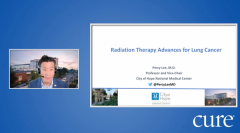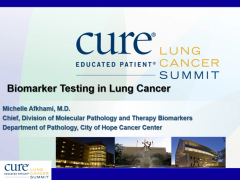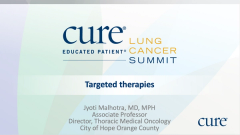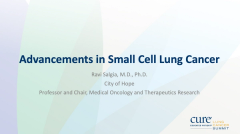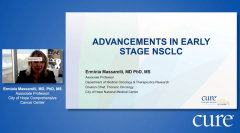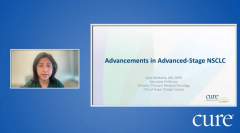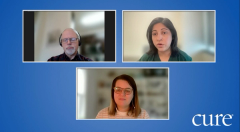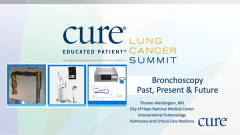
Educated Patient® Lung Cancer Summit Advancements in Early-Stage NSCLC Presentation: April 29, 2023
Watch Dr. Erminia Massarelli, from City of Hope National Medical Center, discuss advancements in early-stage non-small cell disease during the CURE® Educated Patient® Lung Cancer Summit.
Episodes in this series

Recent years have brought new treatments — both in the pre- and post-surgical setting — for patients with early-stage non-small cell lung cancer, explained Dr. Erminia Massarelli.
“In the last few years, we have had pretty interesting developments and approval of different drugs in early stage non-small cell lung cancer,” Massarelli, an associate professor in the Department of Medical Oncology and Therapeutics Research and division chief of thoracic surgery at City of Hope National Medical Center, said at the CURE® Educated Patient® Lung Cancer Summit. “So we call adjuvant therapy when it follows surgical resection of the tumor and your adjuvant therapy when actually we do systemic therapy before the surgical resection of the tumor.”
Neoadjuvant Treatment
Before patients undergo surgery to remove their cancer, they may receive neoadjuvant treatment, which is therapy designed to shrink tumors before they are removed to increase the likelihood of cure.
In this setting, patients may receive chemotherapy, immunotherapy and/or targeted therapy — each either alone or as a single-agent. Of note, a clinical trial showed that the immunotherapy drug, Opdivo (nivolumab) improved survival outcomes for patients with stage 1B-3A non-small cell lung cancer when given within six week before surgery. Based on those findings, the Food and Drug Administration (FDA) approved the treatment in that setting.
“It’s important to really attack the non-small cell lung cancer when it’s early on, when there is still an option of cure,” Massarelli said.
Looking ahead, a clinical trial is investigating the use of Tagrisso (Osimertinib) either alone or in combination with chemotherapy for neoadjuvant treatment of patients with EGFR-mutant non-small cell lung cancer.
Adjuvant Treatment
The goal of post-surgical treatment (also known as adjuvant treatment) is to decrease the risk of cancer recurrence, Massarelli said.
Research has shown that Tecentriq (atezolizumab) tends to improve survival outcomes over chemotherapy for stage 2-3A disease that has been surgically removed and is PD-L1 positive, meaning that the cancer cells express the PD-L1 protein, which Tecentriq targets. As such, the immunotherapy drug is FDA-approved in this setting.
Keytruda (pembrolizumab) is also approved for patients with stage 1B, 2 and 3 surgically resected non-small cell lung cancer, regardless of PD-L1 status, as the checkpoint inhibitor showed improved disease-free survival (time a patient lives after treatment without signs or symptoms of cancer) compared with placebo.
Additionally, Tagrisso is approved for the post-surgical treatment of patients with EGFR exon19-deletion stage 1-3 non-small cell lung cancer.
“In conclusion, as of today, early-stage non-small cell lung cancer can actually be effectively cured,” Massarelli said. “We are increasing more and more the chances of cure either giving treatment before surgery or actually giving treatment following surgery.”
For more news on cancer updates, research and education, don’t forget to

